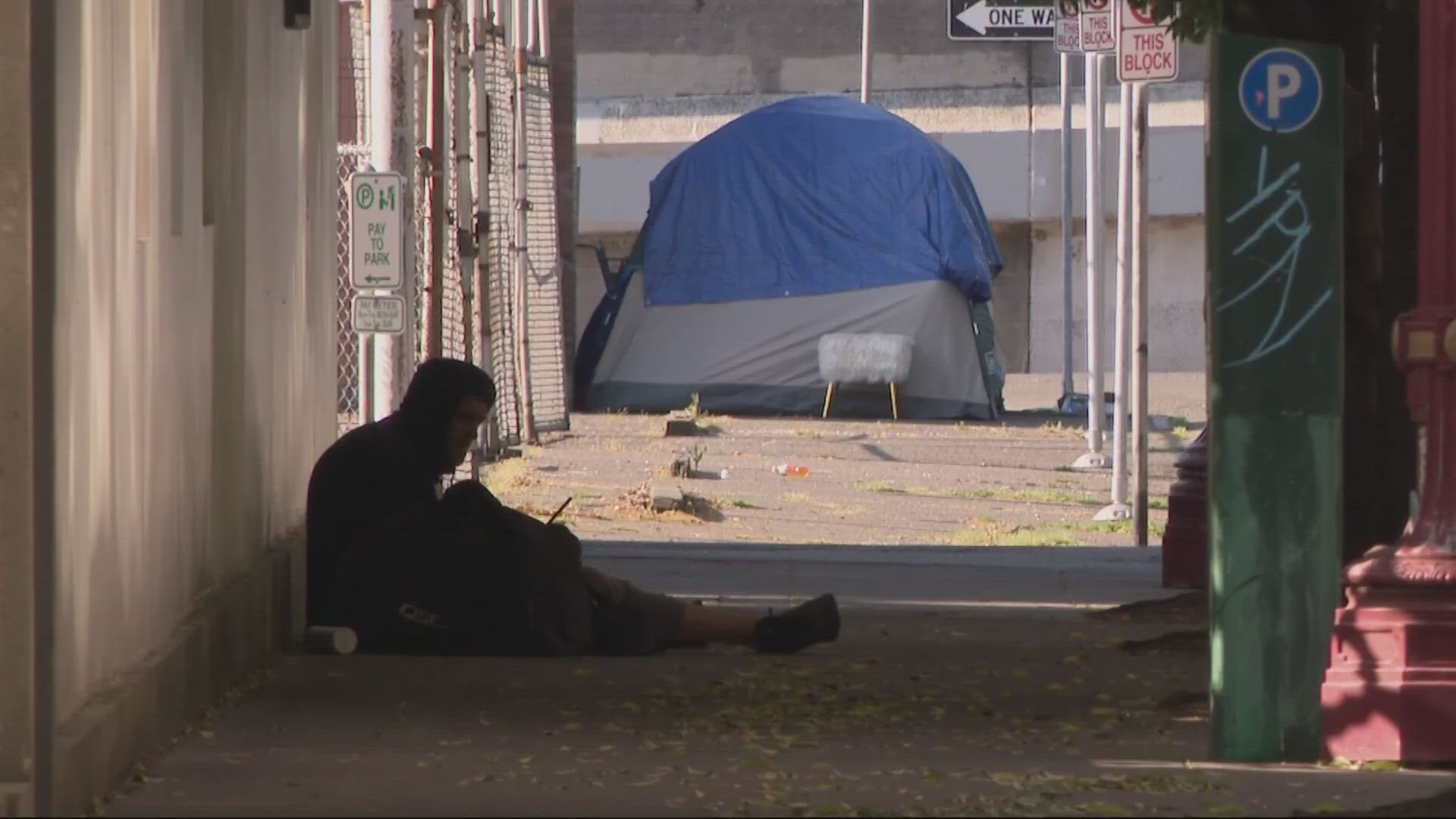PORTLAND, Ore. — The Portland City Council voted Wednesday morning to accept a settlement agreement in a lawsuit brought by 10 plaintiffs who argued that the city's failure to keep public sidewalks clear of homeless encampments violates the rights of people with disabilities under the Americans with Disabilities Act.
The plaintiffs sued the city in federal court in September, and the parties announced in November that they were in mediation to pursue and out-of-court settlement. News of the tentative settlement emerged last week.
The settlement decision was one of three big homelessness items that the council was scheduled to hear on Wednesday, along with a vote on extending the city's contract with Multnomah County's Joint Office of Homeless Services, which passed 4-0, and an initial hearing on a proposal from Mayor Ted Wheeler to ban daytime camping in the city.
Settlement details
The terms of the tentative settlement, as outlined by city staff, include several terms and policies that the city will agree to either put in place or maintain if they're already in place:
- The city will maintain a campsite reporting system online and through 311, with an option to note if a camp is blocking a sidewalk.
- The system will include an option for a person with disabilities to separately request accommodation regarding a sidewalk campsite.
- The city will assess sidewalk obstructions within 5 business days after each report.
- The city will prioritize requests for accommodation from people with disabilities, and will ensure that at least 40% of its camp removals per year are addressing sidewalk obstructions.
- The city will remove at least 500 campsites obstructing sidewalks each fiscal year.
- The city will post "no camping" signs in places where there have been repeated obstructions on sidewalks.
- The city will not distribute tents except in limited circumstances such as at severe weather shelters or to replace property damaged during a camp removal.
- The city will commit at least $8 million to fund the Impact Reduction Program for fiscal year 2023-24, and at least $3 million per year for the following four fiscal years.
- The agreement lasts 5 years, during which the federal court will be able to enforce the settlement, and the city will make quarterly progress reports.
- The city will pay each plaintiff $5,000 in damages.
Wheeler's daytime camping ban proposal is not one of the terms of the settlement, the plaintiffs' attorneys said last week, but they said it would complement the city's obligations.
In response to a question from Commissioner Mingus Mapps, city staff said the Multnomah County Joint Office of Homeless Services is not obligated to follow the terms of agreement because the lawsuit was only brought against the city.
The tent distribution ban also doesn't apply to the joint office, according to city staff; the city contributes funding to the office, but the office is not considered to be a city contractor.
Public support for settlement
There were 36 people signed up to testify about the settlement at Wednesday's council meeting, many of whom identified themselves as people with disabilities, and the vast majority of whom expressed support for the settlement agreement.
"What happens when you make the streets safe for us, you make them safe for everyone," said Keith Martin. "If they're clear for people with disabilities then they're clear for homeowners, they're clear for students, they're clear for shoppers downtown. It's a major step."
There were objections, however, with some commenters arguing that clearing individual camps won't keep sidewalks accessible overall because campers with no other options will simply move to other stretches of sidewalk.
"There are better ways to make the sidewalks safe for people with disabilities without violating the rights of homeless people," said Serenity Ebert. "Many of the people living on the streets of Portland are also disabled. They were displaced and forced onto the streets by lack of access to affordable housing and adequate care. You cannot simply clear tents without giving people safe, viable and accessible housing."
Council accepts settlement
The council voted unanimously in favor of the settlement. Commissioner Dan Ryan called it a step in the right direction, and Commissioner Carmen Rubio said the city needs to balance the needs of residents with disabilities and residents experiencing homelessness.
"The lawsuit should not have been necessary for the city to do what is right, but I'm glad you filed it," Commissioner Rene Gonzalez said. "We have been too slow in addressing unsanctioned camping and crime on our streets."
Wheeler said he had received questions asking why the city didn't take action on sidewalk camping earlier, and he said it was in part because the city was following federal guidance to pause sweeps during the COVID-19 pandemic, and because the city had fewer shelter beds available. But he added that he agreed with the plaintiffs in the lawsuit.
"Martin v. Boise did not go away during COVID," he said, "so that was still a concern first and foremost in our minds, that we upheld constitutional rights as well as followed CDC guidance during a global pandemic. That being said, it's very common for me to get sued in my role as the mayor of this city, and I don't always welcome being sued. This is a notable exception."
He also mentioned the proposed ban on daytime camping scheduled for a council vote later on Wednesday, and said his plan to open six large-scale sanctioned camping areas would address the question of where homeless residents are supposed to go when told to move from sidewalk camps.

